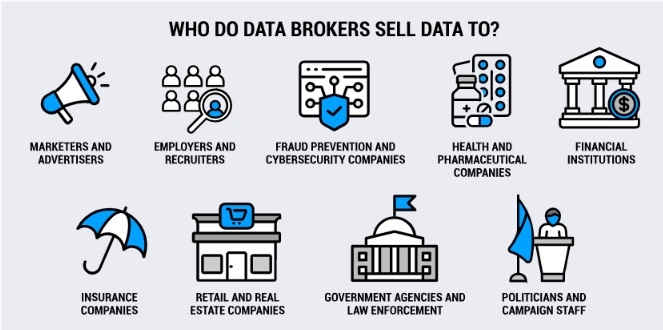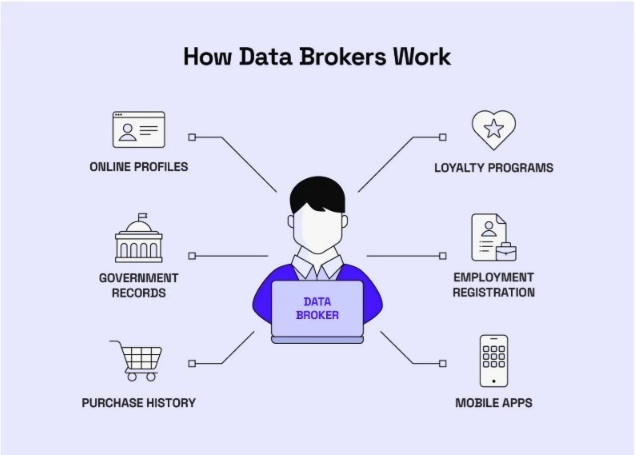What Are Data Brokers?
You may not have heard the term before, but data brokers impact almost every aspect of your daily life. These companies or individuals collect, analyze, and sell massive amounts of personal and behavioral information about millions of people — often without their knowledge or consent. From the ads you see online to the insurance rates you're offered, data brokers operate behind the scenes, creating detailed profiles that influence decisions about you.
They typically don’t interact directly with consumers but play a crucial role in the modern data economy by enabling targeted advertising, credit risk assessments, and other data-driven services. This means your digital footprint—everything from your shopping habits to your location—can be compiled into a detailed dossier about you. To learn more about how online tracking affects your privacy and freedom, see The Impact of Online Tracking on Your Privacy and Digital Freedom.

Why Should You Care?
Imagine searching online for running shoes, and suddenly, ads for fitness gear follow you everywhere. That’s data brokers at work. But their impact goes far beyond advertising. The information they collect can affect your credit applications, insurance premiums, job opportunities, and even political campaigns.
Most people have little idea just how extensively their behaviors, preferences, and even predictions about their future actions are tracked, analyzed, and traded—often without their explicit consent. This lack of transparency makes data brokers a growing concern, as consumers usually cannot see what information is held about them or how it is shared.
For tips on protecting your identity against such threats, check out Protecting Your Digital Identity in an Era of Data Breaches.
Adding to the urgency, the global data broker market was valued at an estimated $290 to $435 billion in 2025 and is expected to grow to between $420 and $700 billion by 2030-2034, expanding at an annual rate of 7-8% (sources: Yahoo Finance, Grand View Research). This rapid growth highlights just how deeply embedded data brokers have become in everyday life.
Consider this: you discover a new credit card has been opened in your name. This isn’t just a banking error—it could be the result of data brokers collecting and selling your financial details behind the scenes. Or imagine targeted political ads appearing after you casually browse a news article. These are not coincidences but carefully orchestrated outcomes of data trading.

This opacity, combined with the scale of data collected, raises significant risks including identity theft, discrimination, and manipulation. As a result, policymakers and privacy advocates are pushing for stronger regulations and greater transparency in the data brokerage industry.
Types of Data Collected by Data Brokers
Data brokers gather an astonishing range of information, such as:
- Demographics: age, gender, race, education, marital status, household size.
- Purchasing behavior: your shopping history, brand preferences, spending patterns.
- Online activity: websites visited, search history, social media engagement, app usage.
- Location data: where you live, work, travel — tracked in real time or historically.
- Financial information: credit scores, loan details, income estimates, payment habits.
- Medical records: health conditions, prescriptions, insurance claims, often aggregated from healthcare databases.
Each data point adds another brushstroke to a detailed portrait of your life, preferences, and habits. For a deeper dive into the types of data collected online, see Types of Data Collected on the Internet.

Where Does All This Data Come From?
Data brokers pull from a wide variety of sources, including:
- Public records: property deeds, court filings, voter registrations.
- Websites and apps: trackers, cookies, pixels, and SDKs that monitor your online behavior.
- Social media: publicly available posts, friend lists, likes, and shares.
- Credit reporting agencies: financial histories shared through partnerships.
- Data partnerships and exchanges: information bought or swapped with retailers, loyalty programs, and other businesses.
By combining these pieces, brokers create comprehensive profiles without you ever seeing or consenting to the process.
Industry Leaders You Should Know
The data brokerage industry is dominated by several major companies that control vast amounts of consumer information and provide data-driven services to businesses around the world. Some of the biggest players include:
- Acxiom: One of the oldest and largest data brokers, Acxiom specializes in collecting consumer data for targeted marketing and analytics. It maintains databases with information on hundreds of millions of consumers globally and offers services that help companies personalize advertising and understand customer behavior.
- Experian: Known primarily as a credit reporting agency, Experian also operates as a data broker. It collects financial, demographic, and behavioral data, which it uses to help lenders assess credit risk, as well as for marketing and fraud prevention services.
- CoreLogic: CoreLogic focuses heavily on real estate, mortgage, and financial data. It aggregates property records, mortgage information, and consumer credit data to support financial institutions, insurers, and government agencies.
- Equifax: Another major credit bureau, Equifax collects and sells consumer credit information, financial histories, and demographic data. Its services include credit reporting, identity verification, and fraud detection.
- Oracle Data Cloud: A division of Oracle Corporation, it provides data and analytics solutions to marketers, combining offline and online data sources to improve customer targeting and measurement.
- Dun & Bradstreet: Specializing in business data, Dun & Bradstreet offers insights on companies, industry trends, and risk assessments, but also collects information related to individuals connected to businesses for various analytical purposes.
These industry leaders have built extensive data ecosystems that not only power marketing and credit decisions but also influence everything from insurance underwriting to political campaigns. Their reach and influence underscore the importance of understanding who holds your data and how it may be used.
How Are Algorithms and AI Changing the Game?
Imagine an algorithm predicting your next big life decision—before you’ve even made it.
Data brokers are no longer just collecting information; they’re using advanced algorithms and artificial intelligence to forecast your future behavior. That means they not only know what you like now, but can anticipate your next moves—whether it’s buying a home, changing jobs, or even facing certain health risks.
This emerging trend, often called the creation of “markets for future behavior,” offers new opportunities for personalized services. But it also sparks serious ethical concerns about privacy, manipulation, and fairness.
As AI grows more sophisticated, so will the ability of data brokers to predict and influence human decisions. These “predictive markets” could reshape marketing, healthcare, finance, and beyond—bringing both innovation and risk.
That’s why protecting your privacy matters more than ever. Staying informed, using privacy tools, and being mindful of what you share can help you navigate this rapidly evolving landscape—and keep more control over your personal information.
Data brokers shape much of the digital world we live in, often without most people ever realizing it. Their influence extends far beyond the ads we see—they help set insurance rates, determine creditworthiness, and even influence hiring decisions. While data collection is an inevitable part of modern life, understanding how data brokers operate empowers you to make smarter choices about your personal information and privacy.
As the industry grows and new technologies like AI add even more power to data analytics, the stakes are getting higher. Consumers, regulators, and advocates are calling for greater transparency, stricter laws, and new tools to protect privacy. You don’t have to become a data expert to take back some control—simple steps like regularly reviewing privacy settings, opting out where possible, and being mindful about what you share online can make a real difference.
By Vitali Ivaneko


